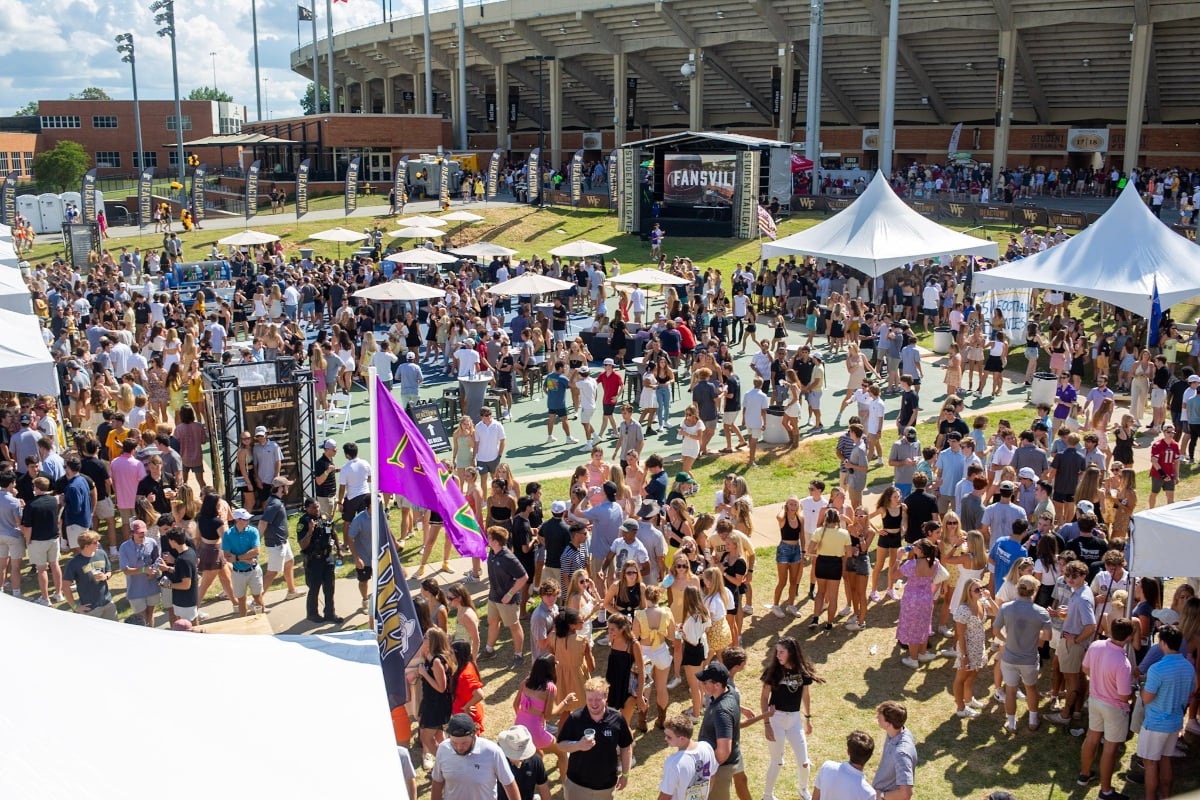
Pre–football game tailgates at Wake Forest University have traditionally been dominated by fraternities, featuring tent after tent emblazoned with Greek letters, housing groups of raucous—often inebriated—students huddled together in their usual places.
“Not only did you have a tailgating area that was not generally inclusive to the entire undergraduate population, it was very much focused on each individual tailgate spot,” said Tim Wilkinson, associate dean for student engagement. “If you weren’t a member of a fraternity or sorority, you didn’t necessarily see a place for you, because you saw Greek letters.”
When tailgating—and football—were canceled last year due to the pandemic, administrators used the reprieve to re-evaluate the university’s insular, decades-old tailgate tradition and brainstorm ways to make it more welcoming to all.
Students returning to campus this fall found a vastly different scene at Truist Field. The tradition known as the DEACTOWN Student Tailgate now included a stage featuring music from a DJ, two bars and free fare from local food trucks, as well as new seating and eating areas. It was all part of the initiative the university launched to attract all students, including those who don’t typically attend football games.
The university also purchased tents, which student organizations can book to tailgate, and provided access to tables and chairs. In the past, student organizations were responsible for bringing their own tents, music, food and alcohol, as long as they followed Wake Forest’s social hosting guidelines, said Wilkinson.
“We wanted to really think about how we could take cost out of being a determining factor for students attending tailgates, as well as have a unified experience,” Wilkinson said.
Wilkinson noted that in the past, the majority of students who attended Wake Forest tailgates were fraternity and sorority members, with little participation from other student groups. This semester the tailgate had the largest student attendance in university history, said Rhett Hobart, associate athletic director at Wake Forest. Additionally, more student organizations took advantage of the tailgate tents, with 29 different student groups—14 of which were non-Greek—booking them, up from 22 in 2019.
Student organizations participating in the tailgate this year included the Black Student Alliance; Young Life, which is a Christian student group; Wake Forest’s School of Law; club sports teams; the Episcopal Student Fellowship; and Wake Forest’s School of Medicine.
“Not only did we see organization involvement grow, but we also saw record student crowds across the board,” Hobart said.
Ninety percent of students attended the home season opener, Wilkinson said. And throughout the season, 86 percent of students who went to the tailgate also attended the football game.
“So right from the beginning of the year, we saw the numbers increase,” Wilkinson said. “We’re very excited about that—it wasn’t ‘OK, Wake’s better this year than they’ve been before, so we have to go to the games,’ but students are going, they’re showing up and they’re staying at the games.”
Wake Forest began planning the initiative over the summer, Hobart said.
“As we started looking at the 2021 season, we felt like there was an opportunity to really dive deep into how we’d create the best possible student experience across the board,” Hobart said. “We felt like there was an opportunity that existed with the student tailgate space to really create a new experience.”
Hobart collaborated with Wilkinson and José Villalba, vice president for diversity and inclusion, and their university departments to create the new student tailgate experience. Villalba said the focus on diversity and inclusion grew out of the university’s R.I.D.E. framework—Realizing Inclusion, Diversity and Equity—along with the Black Lives Matter protests during the summer of 2020.
“It’s not so much that athletics said, ‘We have a problem here’ as much as it was that athletics said, ‘Do we have a chance to make something that has worked out fine, but that could work out even better?’” Villalba said.
Pondering such questions gave the university a chance to recognize aspects of tailgating culture that could be inequitable, including the cost for students to attend or for organizations to register, Wilkinson said. Additionally, because student organizations previously had to bring their own tents and stake out their own areas within the tailgate, it created an “individualistic” culture, Wilkinson said.
The live DJ allows students to listen to music together, Wilkinson said—rather than see who could blast tunes louder, as they did in previous years. And with the addition of food trucks and two bars run by the university, Wilkinson said students can rent tents without feeling pressure to bring alcohol, since the university is supplying it.
Villalba said he knew the new tailgate was a success when the Wake Forest School of Divinity showed up this year for the first time in ages. He noted that the divinity school is one of the university’s most diverse student groups, both racially and socioeconomically.
“The fact that 150 divinity school faculty, students and alum showed up and had a great time is a really great example of what student reception has been,” Villalba said.
The initiative wasn’t about diversifying the tailgate experience, Villalba said, but rather creating more inclusion and equity on campus.
“I hope more schools can create inclusive and equitable experiences for their students, whether they be tailgates or anything else,” Villalba said. “And I know that we need to do it in other spaces as well, and so this is proof of concept for us, too.”
Hobart said he hopes the tailgate initiative expands in the coming years.
“We want to see it continue to grow,” Hobart said. “We saw record crowds across the board this year, but there’s still the opportunity for growth still, and we want to continue to have more organizations be afforded the game-day experience.”
from Inside Higher Ed | News https://ift.tt/3HBvJBQ


No comments:
Post a Comment